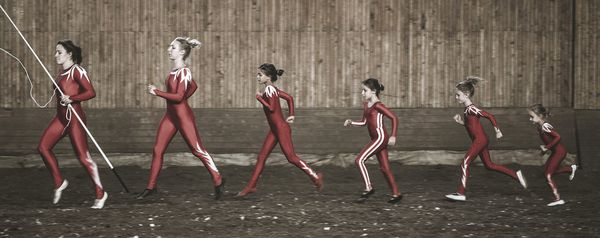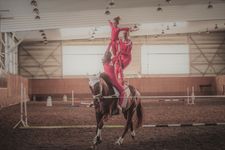 |
| Katerina Poryzała: 'I think that we managed to open the girls up because we were also so naive, and beginners at this type of filmmaking' Photo: Courtesy of Warsaw Film Festival |
“We knew nothing about vaulting”, said Karolina, considering the start of the project. Monika adds: “We visited them, with regards to a music video, and we saw a chance to make a film about sisterhood, femininity, and growing up. We were enthusiastic and I think that the girls developed since the time of the music video to another level. They really liked the music video and we decided: okay let's continue, and we got closer and closer, so that sums up the process”.
But this process was very difficult – not only the long-term production of five years, but due to the background of directors too. Monika Kotecka says: “My father is a biologist and it was his dream-come-true once I told him, ‘I'm not going to be a psychologist’ – he said, ‘Maybe you'll be the second David Attenborough’. That and the fact that Carolina studied zoology speaks to why nature is very important for us.
"When we started getting closer to the girls, the fact that the vaulting is quite difficult for the horse was a thing for us - after we got caught - because at first, we were enthusiastic, like looking for what the girls are doing, but then it got complicated for us emotionally. It was important for us to show how the human world resonates with the horses through the girls’ emotions and nature itself. We decided that nature itself will lead us.”
 |
| Monica Kotecka: 'When we started getting closer to the girls, the fact that the vaulting is quite difficult for the horse was a thing for us' Photo: Courtesy of Warsaw Film Festival |
It is no secret that working with children can be hard, but as Kotecka reveals, it was the other way around. “It was easier to get to the younger ones, than to the older ones. I think that the small girls liked our minimal involvement.” Poryzała adds: “I think that we managed to open the girls up because we were also so naive, and beginners at this type of filmmaking, and the fact that we were also girls.”
Finally Monika tells us about girls’ amazing reaction after the screening. “Even though they’re involved in a sport, they were able to draw a lesson for their lives. Take the example of Zosia, the girl cutting her hair near the end, when she realises that it doesn’t matter that they didn’t compete because the journey was the greatest lesson of her life. You’re not getting what you want, but you’re getting something different.”
The directors' observational style grew out of their intention not to impose anything on their subject, and just let the story develop on its own. Speaking about the HBO Max selection, Poryzała adds: “They watched the clips through festival rounds, and they liked it. They had a screening, and afterwards they said: it’s nice but we don’t like it because you need to plunge deeper and deeper. We said: ‘Yes, we can, but we need money if you trust us’. And they gave us financing and soon we started shooting.”
Now Poryzała is working on a series for HBO Max. It is not the story of Volteo although a lot of material has been accumulated over five years. And she thinks that it may be perfect for Kotecka’s debut showrunner project.





















